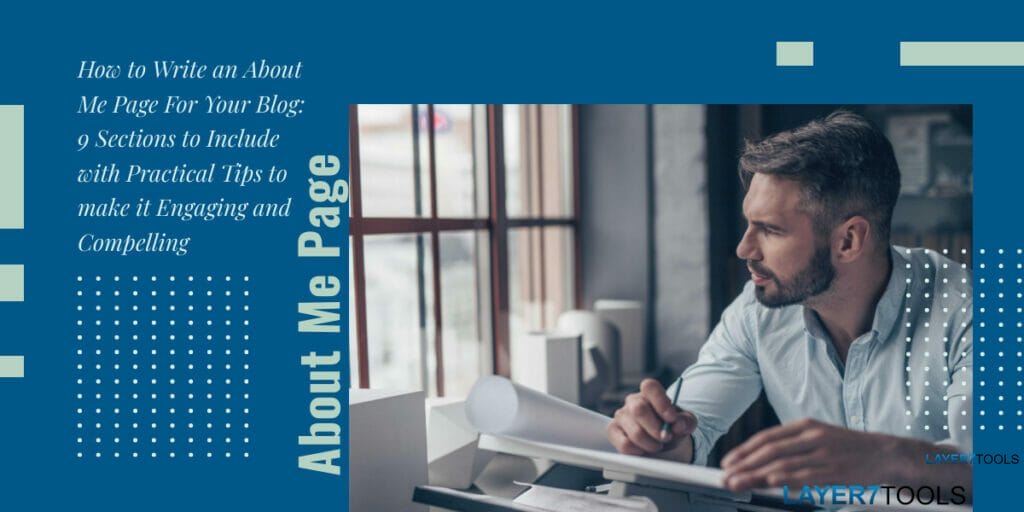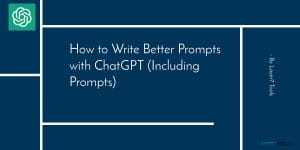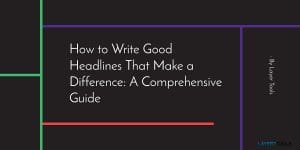
How to Write an About Me Page For Your Blog: 9 Sections to Include with Practical Tips to make it Engaging and Compelling
Whether you’re writing for your blog or website, an about page is super important. It tells your website readers who you are and what you stand for. It is also useful for connecting with your audience and building trust.
But how to write an about me page for your blog that is simple yet effective? And how do you make sure it stands apart from every other “about” page online? This post will teach you everything you need to know to create an engaging and compelling “about” page that helps you get found online.
I’ll cover nine sections that every blogger needs to include on their “about me” page. After that, I will also provide you how to write with practical tips and examples. In the end, I will even provide an example template to download.
What is an about me page for your blog, and what to Include in it?
You’ve decided to start a blog. Congratulations! But before you start writing your first post, there’s one important page you need to create first: your website’s about me page.
An about page is a must for any blog. It’s an opportunity to introduce yourself to your readers, tell them what your blog is about, and explain why they should keep coming back. But if you’ve never written an about page before, you may be wondering how to write one that Perfectly Represents You™.
Some things you should include on the about me page are :
- Your blog’s mission statement
- A brief history of your blog
- An overview of your blog’s content
- Links to your social media profiles
- A photo of yourself
- Use Testimonials
- Use Social Proof
- Invite comments and questions
- A call to action
1. A photo of yourself
An about me page should include a photo of the author, whether a professional headshot or a casual snapshot. A photo helps readers put a face to the name and connect with the author on a personal level. Of course, if you’re not comfortable including a photo of yourself, you can always include a photo that represents your brand or personality.
In addition to a headshot, you may also want to include other images on your About page. These could be pictures of you working on your blog, shots taken at recent events, or pictures representing your personality and interests. As a famous quote says: A picture is worth a thousand words!
2. Your blog’s mission statement
One of the benefits of including your blog’s mission statement on your About Me page is that it can help to keep you focused on your goals. Having a clear mission statement can remind you of what you are trying to achieve with your blog and help to keep you on track.
With a well-written and concise mission statement, you may pique the curiosity of people who share your passions.
3. A brief history of your blog
A brief history of your blog on your “About Me” page is a great way to explain to your readers why you blog and what they can expect from your site. It’s also a good opportunity to tell about awards or recognitions your blog has received and other relevant information that would help new readers understand your blog.
4. An overview of your blog’s content on the about me page
Some benefits of including an overview of your blog’s content on your about me page include:
- It helps give your readers a better understanding of your blog and what they can expect to find on it.
- It can help attract new readers interested in the topics you write about.
- It can remind existing readers of the topics you cover if they haven’t visited your blog in a while.
To get started, write a few sentences (or even a paragraph) describing the topics you typically write about on your blog. Be sure to include a blog link so interested readers can easily find it.
You may also want to mention special features or series on your blog – this can help make your blog’s About Me page more engaging and informative.
5. Your contact information and Links to your social media profiles
Including your contact information, like your email address, and links to your social media profiles on the bio page can be extremely beneficial. It lets your readers easily get in touch with you if they have any questions or comments, and it also helps them connect with you on social media. This can help you build a stronger relationship with your readers and grow your audience.
To add social media links to your bio page, find the icons or buttons for your desired platforms and add them to your page. Be sure to include the URL of your profile so people can easily find and follow you. If you have a blog on WordPress, you can use any social plugin to achieve it.
6. Use testimonials as social proof
One of the best ways to add credibility and authority to your About Me page is to showcase testimonials from others. Testimonials work as social proof, and testimonials from happy customers or well-known names in your industry can add a lot of weight to your page and make potential customers or clients more likely to choose you over the competition.
If you’ve worked with clients or customers in the past, ask them for a quote or brief testimonial that you can include on your page. You can also include testimonials from colleagues, peers, or others who can speak to your skills and abilities.
Make sure to choose relevant and impactful testimonials for the message you’re trying to communicate on your About Me page. For example, if you’re trying to position yourself as an expert in a particular topic, look for testimonials that speak to your expertise. Likewise, if you’re trying to highlight your ability to work with clients or customers, look for quotes highlighting those skills.
7. Invite comments and questions
But moderate them if necessary one of the best ways to connect with your readers is by inviting them to leave comments or questions on your about me page (and then actually responding when they do!). But if you are getting a lot of spammy comments or personal messages that are off-topic, consider moderating them before they appear on your site.
8. Include A call to action (e.g., urging readers to subscribe to your blog)
A CTA (Call To Action) can be a powerful way to encourage your readers to subscribe to your blog. A call to action helps remind your readers of the value of your content and encourages them to stay subscribed. Additionally, a call to action can help you build a stronger relationship with your readers by asking your readers to take an active role in supporting your blog.
9. Update regularly
As with all parts of your blog, keep your blog’s about me page up-to-date with any changes in your life or blogging journey – whether that means adding new information, removing outdated stuff, or simply freshening up the language. But make sure don’t rewrite your About page every month; make an update at most once per quarter to keep the page relevant for visitors.
How to Write an About me for a blog that is Engaging and Compelling
Now that you know what elements to include in an about me page, it’s time to learn how to use those elements to write a killer about me page.
Here are ten practical tips to help you get started.
- Keep your paragraphs short and to the point
- Be honest and authentic
- Use the first person’s point of view and Use an Active Voice
- Write in a friendly and approachable tone
- Use positive language
- Use Strong Words
- Share your passions and interests
- Use Humor
- Share your story in a way that is more relatable to your readers
1. Keep your paragraphs short and to the point
You don’t necessarily have to write a novel to tell your story. In fact, some of the most engaging and compelling “About Me” pages are relatively short and to the point. It is a medium to connect with your readers and give them a glimpse of who you’re, what you do, and what you’re all about. A few paragraphs are usually quite sufficient.
You can ask yourself the below questions to start:
- What are my unique selling points?
- What sets me apart from other bloggers in my niche?
- What are my strengths?
- How can I position myself as an expert in my field?
Once you’ve answered these questions, you’ll have a good starting point for writing your website’s about me page. From there, it’s all about making it engaging and compelling.
For example,
I’m a web designer and front-end developer based in Brooklyn. I help people build websites that are easy to use and beautiful to look at.
I’ve been working in the industry for over ten years, and I’ve had the opportunity to work on some amazing projects with great people. I’m passionate about my work, and I strive to make the web a better place for everyone.
I believe that simple is better, and I like to keep things clean and organized. I’m always learning new things, and I’m always looking for ways to improve my skills.
2. Be honest and authentic
Another important rule of writing an About Me page is to be honest and authentic. Of course, it’s tempting to want to put our best foot forward and make ourselves sound as impressive as possible, but the most successful About Me pages are the ones that feel real and relatable.
That doesn’t mean you have to write your entire life story or every single one of your accomplishments—just give your readers a sense of who you are, what you stand for, and what they can expect from your blog.
Here are a few tips for being honest and authentic on your About Me page:
- Be yourself: The most important thing you can do is simply be yourself. Don’t try to be someone you’re not or present yourself in a way that isn’t true to who you are. Be honest about your thoughts and experiences; people will be more likely to connect with you.
- Be genuine: Another important way to be authentic is to be genuine in your interactions with others. People will likely see right through you if you’re not being sincere. So make sure that your words and actions reflect your true intentions.
- Be transparent: Transparency is also the key to authenticity. Do not try to hide important things from your readers; instead, be open and honest about who you really are and what you believe in. This will help build trust and relationships with your audience.
- Be vulnerable: Being vulnerable can be scary, but it’s also an important part of authenticity. By sharing your fears, weaknesses, and mistakes, you’re showing that you’re human and that people can relate to you. This tip can make it easier for people to connect with you on a deeper level.
3. Use the first person’s point of view and Use an Active Voice
Writing in the first-person perspective is the most effective way to connect with your audience and tell your story. Using “I” statements allows you to share your personal experiences and feelings in a way that is relatable.
Always use the active voice because the passive voice is often perceived as weak or unengaging; the active voice adds power to your text. For example, instead of saying, “I am a writer,” say, “I write.” This small change can make a big difference in how your blog’s “About Me” page reaches readers.
In addition to using the active voice, write in the first person. This will create a more personal connection with readers and make your page more believable. For example, you could start your About Me page with “Hi, my name is [your name], and I am [your job title].” That way, readers will immediately know who you are and what you do.
Once you’ve grabbed readers’ attention with an engaging opening, you can start sharing more details about yourself. Keep things interesting when writing the rest of your about me page by using strong verbs and avoiding clichés. You should also include any relevant keywords you want to rank for on search engines.
4. Write in a friendly and approachable tone
Think of your “about” page as an introduction. It should be friendly and responsive, just as you’d be if you were meeting someone new. When you sit down to write it, imagine meeting someone for the first time and telling them about yourself. What would you say? How would you present yourself?
For example:-.
Hi, my name is Jane, and I’m a web developer. I love developing things for the web and am always looking for new challenges. I’m a lifelong learner and love to share what I’ve learned. I’m also an avid reader and a bit of a foodie.
5. Use positive language
Use positive language throughout your About Me page. No one wants to read about someone who is unhappy, bitter, or negative. So keep things positive, optimistic, and upbeat instead.
You want your website readers to get a feel for who you are as a person, and using positive language will help them see that you are someone worth getting to know.
Some other language tips to keep in mind:
- Use active voice rather than passive voice.
- Use contractions to sound more like you are speaking to a friend.
- Use first person point of view (“I”, “me”, “we”, “us”) rather than third person (“he”, “she”, “they”).
6. Use strong words
Use strong words that pack a punch that describe you and your work in the most accurate and compelling way possible.
For example,
I am a passionate writer who is driven to create stories that inspire and entertain.
I am an experienced software engineer who is skilled in developing high-quality code.
7. Share your passions and interests
Share your passions and interests but don’t go overboard! Mention the things you love – whether it’s blogging, cupcakes or cocktails – but don’t go into too much detail unless it’s relevant to your blog’s niche/topic.
8. Use humor
The “About Me” page of your blog is the perfect place to inject a little bit of your personality into your blog. After all, readers want to get to know the person behind the blog, and a good sense of humor is a great way to endear yourself to them.
Don’t force it, though – only use humor when it comes naturally to you. No one likes it when you try hard, and if you’re not naturally funny, it comes across as forced and fake.
Here are some ways you can add some humor to your “About Me” page:
- Use self-deprecating humor – we all love a good humblebrag, and if you can make fun of yourself, readers will warm up to you right away.
- Be tongue-in-cheek – don’t take yourself too seriously, and don’t be afraid to poke fun at the industry you’re in.
- Use pop culture references – references to TV, movies, or celebrities are always a guarantee for laughs (just make sure you choose references that will stand the test of time!).
9. Share your story in a way that is more relatable to your readers
When you tell a story in a relatable way, it can help your readers feel connected to you and your experiences. Being open and honest about your journey can create a sense of trust and understanding that can benefit you and your readers. Additionally, sharing your story can help others who may be facing similar challenges feel less alone and more supported.
When you’re writing your “About Me” page, it’s important to remember that your readers want to know about you and how you can relate to them. So, while sharing your story is great, make sure you also focus on how your experiences can help your readers.
For example, if you’re a professional writer, you might want to share your story of how you became a writer and what drives you to write. But don’t stop there! Also, talk about how your experience can help your readers become better writers themselves.
By sharing your story and how it can help your readers, you’ll create an “About Me” page that is relatable and useful.
When writing your story, think about what makes you unique. What are your passions, and what drives you? What are your values, and how have they influenced your life? You can also share any challenges you’ve faced and how you’ve overcome them.
Don’t be afraid to be vulnerable and share your authentic self. Your goal is to connect with your readers on a deeper level, so it’s important to be open and honest. Trust that your readers will appreciate your transparency.
Page Template for About me Page
You can download a sample page template below. It is free, and let me know your comments below.
I will post the template soon.
Conclusion
In summary, if you have a blog or a website, you should definitely write an “About” page on your blog. This will give the visitors a quick overview of who you are and why they should read your posts. It also allows you to reveal information about yourself, which builds trust and credibility. Finally, it makes it easier for search engines like Google to find your site and rank it higher in their results.
Other Useful Guides:-
5 Tips on How to Write Meta Descriptions for Products to Get More Click-Throughs
11 Tips on How to Write Amazon Product Description That Drives Traffic And Sales
- WPVivid Backup Plugin Review (2023): Backup, Restore, Stage, and Migrate WordPress Sites - March 1, 2023
- How to Write Better Outlines with ChatGPT (Including Prompts) - February 3, 2023
- How to Write good headlines that grab attention and drive conversions - January 27, 2023




